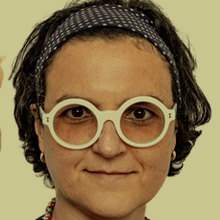Vamos a tener un vis a vis con una humorista gráfica de gran renombre y empuje, la venezolana radicada en Miami, Rayma Suprani.
Es caricaturista editorial, ilustradora y satírica política. Recientemente ha expuesto sus obras en Houston, Nueva York, Madrid, Barcelona, Ciudad de México, Caracas y Miami. De 1995 a 2014 fue caricaturista editorial de El Universal, uno de los principales diarios venezolanos. Durante este período, publicó diariamente una sátira política muy influyente. Ha obtenido varios premios y distinciones internacionales.
Pero como me gusta hacer casi siempre en este "tete a tete", prefiero que sea ella la que se presente…
PP: Estimada Rayma, ¿te puedes presentar tu misma para los que quizás no te conozcan?
RAYMA: En realidad me cuesta hablar de mí misma, pero puedo decir que soy una mujer feminista sin dejar de reconocer la otra mitad del planeta masculino, pero feminista con el empuje de trabajar en pro de las igualdades de género, que tanto hacen falta para tener un mundo equilibrado. Soy una mente gráfica y creativa, periodista de profesión y caricaturista por vocación. Adoro mi trabajo de expresar con dibujos la realidad que nos rodea. Lo hago desde los 4 años y me ayuda a entender el mundo en que sobrevivimos, para proyectar la vida en un mundo mejor. Mi línea de trabajo son los valores fundamentales de la civilización, democracia, derechos humanos y libertad. Es por eso que me defino como Rayma.
Y en definitiva, Rayma es Rayma.
PP: Perfecto. Gracias. Comenzamos entonces. Haces humor político. Pero veo -quizás me equivoque-, dos dimensiones: cuando haces sátira contra el gobierno de Venezuela eres más directa, más localista y usas más textos que imágenes sin palabras. Y cuando haces humor político más universal creas más viñetas sin textos. ¿Es que las de Venezuela las diriges más a un público venezolano?
RAYMA: Hacer humor político en Venezuela durante 19 años, con publicaciones diarias en uno de los periódicos mas importantes del país fue una gran escuela, ya que mantener lectores interesados en el acontecer durante 365 días al año es todo un reto.
La política venezolana durante esos años pasó de una democracia a una dictadura, donde se desarticularon las instituciones, los medios de comunicación y las empresas para formar un estado totalitario. Nunca pensé que me tocaría dibujar la destrucción de la República y mucho menos hacerlo com humor y consciencia gráfica .
Después de mi obligatoria salida de Venezuela, debido a amenazas y persecuciones políticas, mi trabajo, se amplió a un nivel más global agregando códigos más universales al humor y diferenciándolo del esquema local que yo había venido trabajando.
PP: Tenía razón yo entonces. Te digo que a mi humilde juicio, estuviste muy acertada en esa decisión. Seguimos, Rayma, ¿el humor derriba gobierno? Si no es así, ¿por qué es importante hacerlo?
RAYMA: La caricatura es el termómetro de las libertades de un país y un gran medidor de la sana democracia que pueda existir.
En mi opinión, voto y la consciencia de los pueblos sí derriban gobiernos. Quizás el humor ayuda a mirar esa realidad que muchos no desean ver y la muestra como un espejo, lo cual en algunos casos es un ejercicio doloroso y difícil de digerir, pero el humor lo hace fácil y accesible para todos, en una maravillosa manera de llegar como una daga al inconsciente colectivo. Allí está el miedo que le tienen los gobiernos a la caricatura.
PP: De total acuerdo contigo. Y para continuar en esa línea, ¿el humor es de izquierda? ¿De derecha? ¿De ambos? ¿De ninguno?
RAYMA: El humor es el espejo de una sociedad, la representa en su idiosincrasia local o universal, en sus virtudes y defectos, en sus complejos y superioridades.
El trabajo de un caricaturista es desacralizarlo todo, llevar los temas intocables al entendimiento colectivo, mostrar los temas ocultos y hasta acabar con sus propios tabúes personales, con tal de encontrar una idea que lo lleve al aporte gráfico.
El humor no tiene concesiones, porque trabaja con el libre ejercicio del pensamiento llevado al inconsciente de un creador y se nutre del mundo subversivo como una inteligente arma de combate.
PP: Es cierto. Comparto contigo esa opinión. Sin embargo, me gustaría tocar más el punto que mencionaste como “acabar con sus propios tabúes personales”, porque me interesa mucho. Lo digo así: un humorista es de ideología A y está en la oposición porque gobierna la ideología B. Hace su humor crítico, su sátira política. Perfecto. Pero entonces, cambia todo y ahora el gobierno B pasa a la oposición y el gobierno de ideología A, la misma del humorista, comienza gobernar. Entonces resulta que ese humorista no critica lo mal hecho por su gobierno, no hace humor satírico. Eso lo veo de una deshonestidad terrible hacia la función social del humor. Y pasa, lo mismo para humoristas de izquierda que de derecha. No entiendo esa “defensa de sus ideales”. Lo malo, lo dañino, es condenable, venga de donde venga. Para mí, la causa de esa conducta es un fanatismo extremo e ignorante. En fin, sigamos y disculpa la disgregación… Rayma, abordas mucho el tema del feminismo, pero tu obra no la veo tan agresiva. Hace pensar más en el concepto clásico de la igualdad de derechos, más que en agredir, como lamentablemente sucede con algunas “militantes”. Me gusta tu forma que hace pensar más. ¿Puedes comentar sobre esto?
RAYMA: Soy feminista y trabajo sobre la igualdad de género en mis dibujos, pero creo que necesitamos equilibrio reconociendo el lado masculino e incorporándonos todos a los valores de la civilización.
Siempre me pregunto: ¿si mi abuela hubiera querido ser caricaturista, la hubieran metido en un manicomio? Quizás sí, ya que a muchas mujeres les ha tocado vivir otras vidas que no son las que hubieran querido vivir gracias a la estructura machista que en muchos casos aún opera, y sin hablar de los Talibanes…
Siento una gran responsabilidad por esas mujeres que han dado sus vidas para mejorar nuestros derechos en la actualidad y por las que siguen luchando en la actualidad. A ellas dedico mis dibujos y a la sociedad que necesita abrir los ojos y entender lo maravilloso que es evolucionar en los roles de género.
PP: Para mí es eso: igualdad de oportunidades y derechos. Ahí soy feminista y espero que cualquiera con dos dedos de frente lo sea. Pero menos que eso y más que eso, como ocurre con el machismo o el feminismo de cartón, no lo acepto. Te felicito. Oye, cambio ahora a algo más “artístico”. Por ejemplo, trabajas la caricatura personal, pero no la haces tan estilizada, tan deformada. Casi no tienes intención de hacer sonreír. ¿Por qué?
RAYMA: Me gusta mucho hacer caricaturas personales, he dibujado mucho en vivo con niños y personas de diferentes edades, esto lo aprendi en Francia en muchos festivales de humor, donde se dibuja en la calle y la gente quiere posar, ya que es un paìs donde se ama la caricatura y tiene una importancia educacional.
Para mí, conectar con una persona, mirarnos y que esa persona se deje dibujar es todo un reto, mis dibujos personales no buscan deformar la fisonomía corporal como lo hace la caricatura clásica, en mi caso busco descubrir que hay atrás de esa mirada, como se proyecta el alma en el dibujo, y lo más fantástico es ver como cada ser humano es único e irrepetible en el resultado.
PP: Opinión tan respetable como la que cree que es mejor la deformación total si mantienes el alma del caricaturizado. También haces lo que llamas humor paródico y abunda mucho la parodia a clásicos de la pintura y a íconos muy conocidos. ¿Te gusta más hacer eso que el humor político, la ilustración o lo demás que haces?
RAYMA: Paródica fue una exposición donde hice versiones de los grandes maestros de la pintura en clave de humor. Este ejercicio siempre me ha gustado, es un lenguaje universal y llega fácil, es divertido y fresco para mí. Es como abrir una ventana a otra escala conceptual diferente del humor político. El humor siempre me sorprende, ya que tiene múltiples ventanas de expresión.
PP: El humor es sorprendente, adictivo, increíble. Y ahora para “refrescar” un momento de tanta reflexión, ¿puedes contar una anécdota cómica, curiosa o ingeniosa relacionada con tu carrera en el humor?
RAYMA: Cuando estaba en Venezuela y publicaba mis dibujos en un diario, siempre dibujaba cerdos y los comparaba con los políticos.
Un día llegue a mi trabajo y tenía una carta en el escritorio, la abrí y encontré una hermosa carta de la Federación Porcina de Venezuela. Esta carta solicitaba que por favor no comparara los políticos con animales tan maravillosos como los cerdos, que son nobles, bondadosos, en algunos casos pueden ser hasta mascotas y que sirven para la alimentación de la población aprovechando la totalidad de sus partes…
Esta carta me hizo pensar, y ya no dibujé más cerdos como políticos.
PP: Ja, ja. Muy buena anécdota. ¿Y qué animal comenzaste a usar? ¿Tiranosaurios o bacterias? No, es broma. Rayma, has recibido varios premios y distinciones. ¿Cuál te ha emocionado más? ¿Cuál es el más significativo?
RAYMA: Recibir un premio siempre es un placer, siempre y cuando la estructura que soporta ese premio va acorde con mis valores fundamentales.
Recibir el premio como mejor caricaturista de la Sociedad Interamericana de Prensa y el premio Vaclav Havel a la disidencia creativa en el Oslo Freedom Forum, han sido grandes alegrías en mi haber.
PP: Claro que sí, y lógico que te sientas orgullosa y emocionada. Te felicito de nuevo. Dime una cosa, ¿te gustaría hacer algo dentro del humor que no hayas hecho aún?
RAYMA: Siempre me gusta innovar, investigar e ir descubriendo nuevas alternativas en el humor.
PP: Respuesta muy formal. Hubiera preferido que me dijeras que querías practicar el stand up comedy, o escribir una novela humorística u otra cosa, ja, ja, es broma. Disculpa tantas bromistas poco graciosa, pero “es lo que hay”, como dicen por estos lares. Y ahora una pregunta obligada en estos tiempos: ¿cuáles son los límites del humor, si es que crees que haya?
RAYMA: Pienso que el humor no tiene límites. Existe humor para todo tipo de personas y sociedades. Esto es una gran discusión que para mi se inició después de la masacre de Charlie Hebdo, donde asesinaron a varios colegas caricaturistas por dibujar a Mahoma. Sin duda el Dogma frente a la libertad de expresión, puede ser una confrontación.
Pero, ¿a quién le damos el poder de censor en nuestras vidas? ¿Y bajo qué tipo de intereses de censura?
Yo prefiero la Libertar y la libertad de expresión no tiene límites.
Como pudo haber dicho Voltaire: “NO ESTOY DE ACUERDO CON LO QUE USTED DICE; PERO DEFENDERÉ HASTA LA MUERTE SU DERECHO A DECIRLO”.
PP: Es muy cierto lo que dices. Sin embargo, los dictadores, los intereses económicos-políticos, y los militantes de lo políticamente correcto, no piensan como nosotros. A propósito, ¿te han censurado alguna vez? (Creo que sé la respuesta, pero me interesa que los lectores sepan esa información). ¿Practicas mucho la autocensura?
RAYMA: Me han censurado muchas veces y he logrado surfear los caminos para lograr decir lo que quiero. Mi mayor censura fue ser perseguida en mi país y tener que salir de Venezuela. Los resultados han sido una mayor proyección de mi trabajo en la web y mayor denuncia sobre el régimen totalitario venezolano.
Con respecto a la autocensura, creo que es un ejercicio más difícil, ya que estamos sujetos a una educación, ya sea de izquierda o de derecha, a etiquetas establecidas, a religiones, acuerdos culturales, etc… que pueden influir a la hora de dibujar.
Para mí, el trabajo de hacer caricaturas es tratar de despojarse de los propios prejuicios, para lograr ver de manera transparente los temas incómodos que son los que hay que dibujar.
Yo fui educada en la religión católica, pero eso no me limita a la hora de hacer caricaturas sobre la cantidad de curas pederastas que han dañado la vida de niños y niñas.
PP: Correcto. Y te llevo a otro tema: en general, ¿cómo ves el humor gráfico en el presente y en el futuro?
RAYMA: Hoy el humor gráfico y la caricatura son una gran ventana para descubrir los engaños de la sociedad, la política, el nuevo orden mundial, la desigualdad de género, la guerra, la economía global, la pederastia religiosa, regímenes totalitarios vs democracias. Y existen una cantidad de colegas super talentosos que nos entregan a diario sus genialidades sobre el acontecer de hoy. Estamos en una excelente etapa de creación digital en medio de una sociedad tecnológica y líquida.
PP: Es cierto, pero algunos colegas se quejan del cierre de espacios para publicar y de que el esperanzador camino que es Internet, aún no ha resuelto la forma de pago. En fin, todos tenemos razón. Y para. Y terminando este vis a vis, ¿qué pregunta no te hice y te hubiera gustado que te hiciera? Si existe esa pregunta, ¿la puedes responder ahora?
RAYMA: Paso.
PP: Y por último, ¿le puedes decir unas palabras a nuestros lectores de Humor Sapiens?
RAYMA: El mundo debe entender la importancia de que un niño, a temprana edad, aprenda el poder de un lápiz y no de un arma de fuego. El niño que aprende esto primero, es un ser ganado a construir los cambios que necesitamos en el sistema universal de naciones.
PP: Muy bien dicho. Querida Rayma, mil millones de gracias por tu tiempo y buena disposición. Espero que no la hayas pasado mal en esta entrevista. Te deseo mucha salud y que sigan tus éxitos. Un abrazo.
REYMA. Gracias a Humor Sapiens por esta oportunidad de acercarme a sus lectores y poder hablar de mi trabajo y mi experiencia como caricaturista.
Me pueden contactar en mis redes sociales:
@raymacaricatura
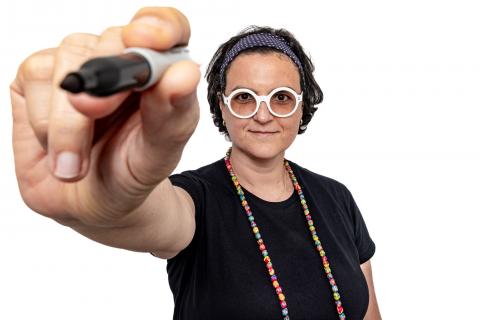
Rayma Suprani
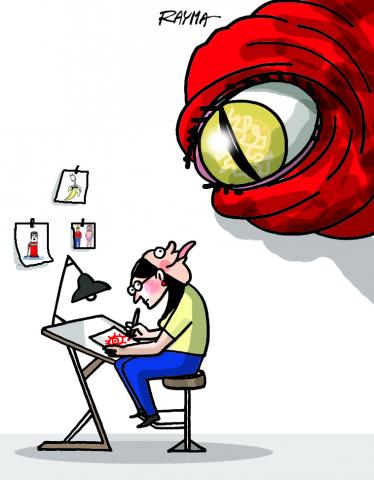
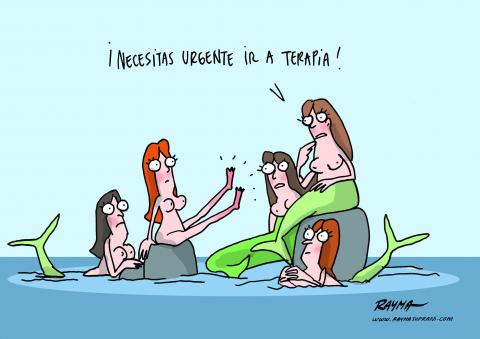
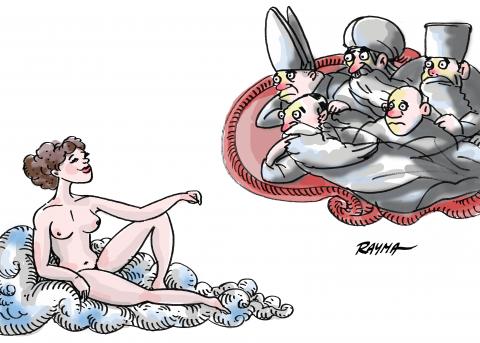
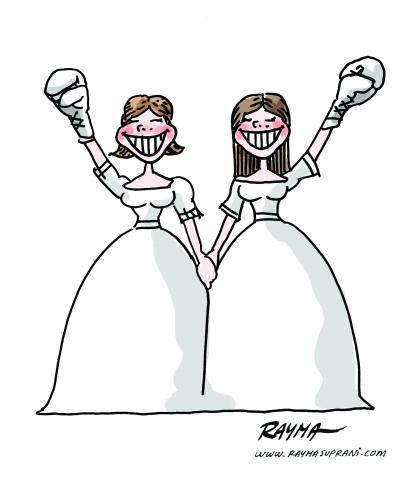
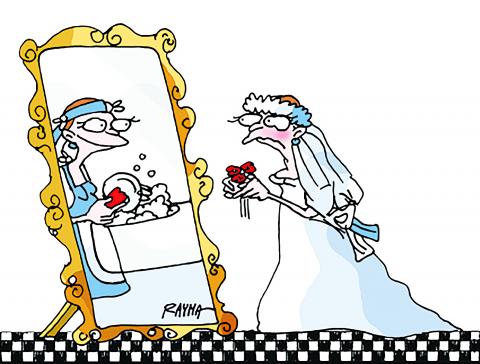
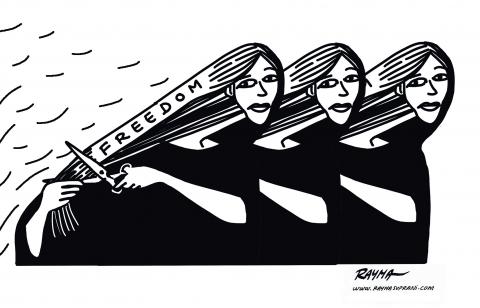
Mujeres iraníes
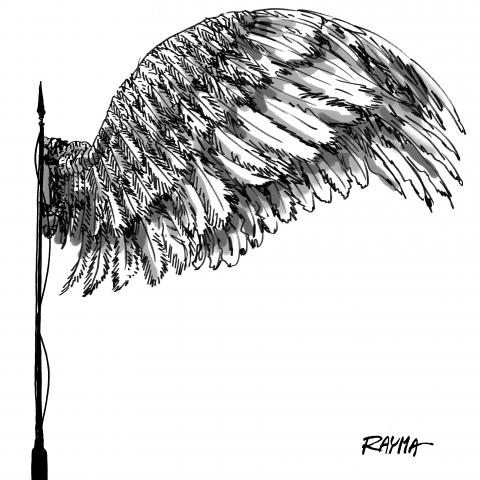
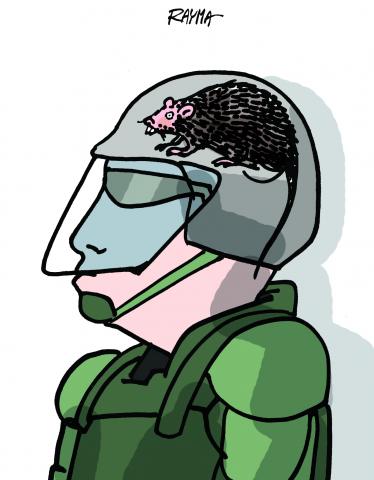
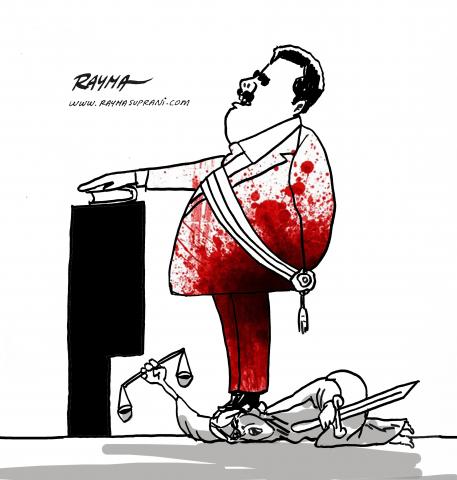
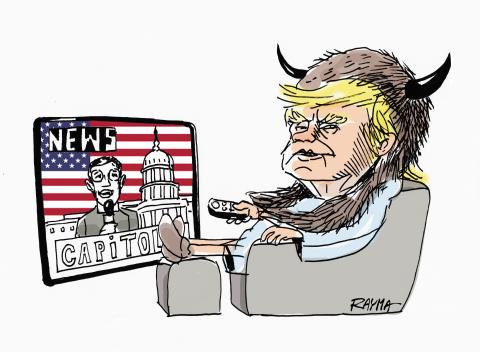
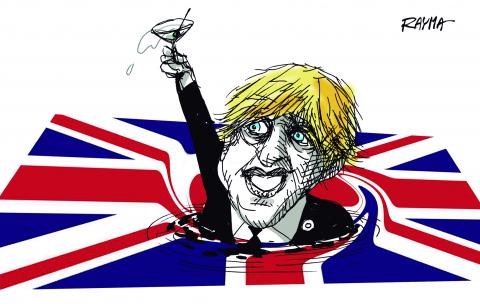
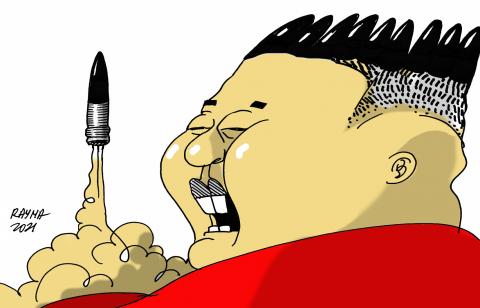
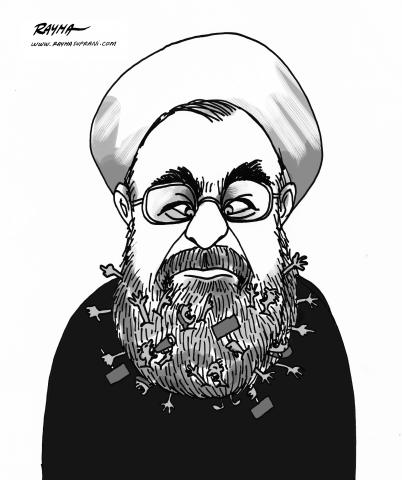
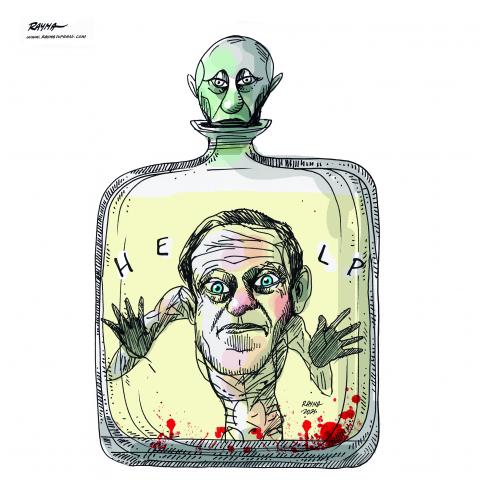
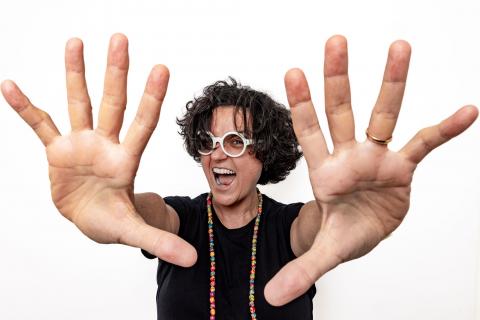
Rayma Suprani
By Pepe Pelayo
The caricature is the thermometer of the freedoms of a country
We are going to “dialocate” with a graphic comedian of great renown and drive, the Venezuelan based in Miami, Rayma Suprani.
She is an editorial cartoonist, illustrator and political satirist. He has recently exhibited his works in Houston, New York, Madrid, Barcelona, Mexico City, Caracas and Miami. From 1995 to 2014 he was an editorial cartoonist for El Universal, one of the main Venezuelan newspapers. During this period, he published highly influential political satire daily. He has obtained several international awards and distinctions.
But since I like it in these “dialogues”, I prefer that she be the one who introduces herself…
PP: Dear Rayma, can you introduce yourself to those who may not know you?
RAYMA: Actually it is difficult for me to talk about myself, but I can say that I am a feminist woman without failing to recognize the other half of the male planet, but a feminist with the drive to work for gender equality, which is so needed to have a balanced world. I am a graphic and creative mind, a journalist by profession and a cartoonist by vocation. I love my job of expressing the reality that surrounds us with drawings. I have been doing it since I was 4 years old and it helps me understand the world in which we survive, to project life in a better world. My line of work is the fundamental values of civilization, democracy, human rights and freedom. That's why I define myself as Rayma.
And ultimately, Rayma is Rayma.
PP: Perfect. Thank you. We begin then. You make political humor. But I see - maybe I'm wrong - two dimensions: when you do satire against the government of Venezuela you are more direct, more localist and you use more texts than wordless images. And when you make more universal political humor you create more vignettes without texts. Are those from Venezuela aimed more at a Venezuelan audience?
RAYMA: Making political humor in Venezuela for 19 years, with daily publications in one of the most important newspapers in the country was a great school, since keeping readers interested in events for 365 days a year is quite a challenge.
Venezuelan politics during those years went from a democracy to a dictatorship, where institutions, the media and companies were dismantled to form a totalitarian state. I never thought I would have to draw the destruction of the Republic, much less do it with humor and graphic awareness.
After my mandatory departure from Venezuela, due to threats and political persecution, my work expanded to a more global level, adding more universal codes to humor and differentiating it from the local scheme that I had been working on.
PP: I was right then. I tell you that in my humble opinion, you were very correct in that decision. We continue, Rayma, does humor bring down the government? If not, why is it important to do so?
RAYMA: The caricature is the thermometer of the freedoms of a country and a great measurer of the healthy democracy that may exist.
In my opinion, voting and the conscience of the people do overthrow governments. Perhaps humor helps us look at that reality that many do not want to see and shows it as a mirror, which in some cases is a painful and difficult exercise to digest, but humor makes it easy and accessible for everyone, in a wonderful way of reach like a dagger to the collective unconscious. There is the fear that governments have of caricatures.
PP: I completely agree with you. And to continue along those lines, is the humor leftist? From the right? From both? Of none?
RAYMA: Humor is the mirror of a society, it represents it in its local or universal idiosyncrasy, in its virtues and defects, in its complexes and superiorities.
The job of a cartoonist is to desacralize everything, bring untouchable themes to the collective understanding, show hidden themes and even put an end to his own personal taboos, in order to find an idea that leads to graphic contribution.
Humor has no concessions, because it works with the free exercise of thought taken to the unconscious of a creator and is nourished by the subversive world like an intelligent combat weapon.
PP: It's true. I share that opinion with you. However, I would like to touch more on the point you mentioned about “ending your own personal taboos”, because I am very interested in it. I say it like this: a comedian is of ideology A and is in the opposition because ideology B governs. He makes his humor critical, his satire political. Perfect. But then, everything changes and now government B goes into opposition and the government with ideology A, the same as the comedian, begins to govern. So it turns out that this comedian does not criticize what his government has done badly, he does not make satirical humor. I see that as a terrible dishonesty towards the social function of humor. And it happens, the same for comedians on the left and on the right. I don't understand this “defense of their ideals.” The bad, the harmful, is condemnable, wherever it comes from. For me, the cause of this behavior is extreme and ignorant fanaticism. Anyway, let's continue and sorry for the disintegration... Rayma, you address the issue of feminism a lot, but I don't see your work as aggressive. It makes us think more about the classic concept of equal rights, rather than about attacking, as unfortunately happens with some “militants.” I like your way that makes you think more. Can you comment on this?
RAYMA: I am a feminist and I work on gender equality in my drawings, but I think we need balance by recognizing the masculine side and incorporating all of us into the values of civilization.
I always wonder: if my grandmother had wanted to be a cartoonist, would they have put her in an asylum? Maybe so, since many women have had to live other lives that are not the ones they would have wanted to live thanks to the sexist structure that in many cases still operates, and not to mention the Taliban...
I feel a great responsibility for those women who have given their lives to improve our rights today and for those who continue to fight today. I dedicate my drawings to them and to the society that needs to open its eyes and understand how wonderful it is to evolve in gender roles.
PP: For me it is that: equal opportunities and rights. There I am a feminist and I hope that anyone with half a brain is. But less than that and more than that, as happens with machismo or cardboard feminism, I do not accept it. Congratulations. Hey, I change now to something more “artsy”. For example, you work on the personal caricature, but you don't make it so stylized, so deformed. You almost have no intention of making people smile. Because?
RAYMA: I really like making personal caricatures, I have drawn a lot live with children and people of different ages, I learned this in France at many humor festivals, where people draw in the street and people want to pose, since it is a country where caricature is loved and has educational importance.
For me, connecting with a person, looking at each other and having that person allow themselves to be drawn is quite a challenge. My personal drawings do not seek to deform the body's physiognomy as the classic caricature does. In my case, I seek to discover what is behind that look, like The soul is projected into the drawing, and the most fantastic thing is to see how each human being is unique and unrepeatable in the result.
PP: Opinion as respectable as the one that believes that total deformation is better if you maintain the soul of the caricatured person. You also do what you call parodic humor and there is a lot of parody of painting classics and well-known icons. Do you like doing that more than political humor, illustration or the rest you do?
RAYMA: Paródica was an exhibition where I made versions of the great masters of painting in a humorous way. I have always liked this exercise, it is a universal language and comes easily, it is fun and fresh for me. It is like opening a window to another conceptual scale different from political humor. Humor always surprises me, since it has multiple windows of expression.
PP: The humor is surprising, addictive, incredible. And now to “refresh” a moment of so much reflection, can you tell a comic, curious or witty anecdote related to your career in humor?
RAYMA: When I was in Venezuela and published my drawings in a newspaper, I always drew pigs and compared them to politicians.
One day I arrived at work and I had a letter on my desk, I opened it and found a beautiful letter from the Porcine Federation of Venezuela. This letter requested that you please not compare politicians with animals as wonderful as pigs, which are noble, kind, in some cases they can even be pets and which serve to feed the population, taking advantage of all their parts...
This card made me think, and I no longer drew pigs as politicians.
PP: Ha ha. Very good anecdote. And what animal did you start using? Tyrannosaurs or bacteria? It is not a joke. Rayma, you have received several awards and distinctions. Which one has excited you the most? Which is the most significant?
RAYMA: Receiving an award is always a pleasure, as long as the structure that supports that award is in line with my fundamental values.
Receiving the award for best cartoonist from the Inter-American Press Association and the Vaclav Havel award for creative dissidence at the Oslo Freedom Forum have been great joys to my credit.
PP: Of course yes, and it makes sense that you feel proud and excited. I congratulate you again. Tell me something, would you like to do something within humor that you haven't done yet?
RAYMA: I always like to innovate, investigate and discover new alternatives in humor.
PP: Very formal answer. I would have preferred you to tell me that you wanted to practice stand up comedy, or write a humorous novel or something else, ha ha, just kidding. Sorry for so many unfunny jokers, but “it is what it is”, as they say around these parts. And now an obligatory question in these times: what are the limits of humor, if you think there are any?
RAYMA: I think humor has no limits. There is humor for all types of people and societies. This is a great discussion that for me began after the Charlie Hebdo massacre, where several fellow cartoonists were murdered for drawing Muhammad. Without a doubt, Dogma versus freedom of expression can be a confrontation.
But who do we give the power of censor in our lives? And under what kind of censorship interests?
I prefer Libertar and freedom of expression has no limits.
As Voltaire may have said: “I DO NOT AGREE WITH WHAT YOU SAY; BUT I WILL DEFEND YOUR RIGHT TO SAY IT TO THE DEATH.”
PP: What you say is very true. However, dictators, economic-political interests, and politically correct activists do not think like we do. By the way, have you ever been censored? (I think I know the answer, but I'm interested in letting readers know that information.) Do you practice self-censorship a lot?
RAYMA: I have been censored many times and I have managed to navigate the paths to be able to say what I want. My biggest censure was being persecuted in my country and having to leave Venezuela. The results have been a greater projection of my work on the web and greater denunciation of the Venezuelan totalitarian regime.
Regarding self-censorship, I think it is a more difficult exercise, since we are subject to an education, whether from the left or the right, to established labels, to religions, cultural agreements, etc... that can influence when drawing .
For me, the job of making caricatures is to try to get rid of one's own prejudices, to be able to transparently see the uncomfortable topics that need to be drawn.
I was educated in the Catholic religion, but that does not limit me when it comes to making caricatures about the number of pedophile priests who have damaged the lives of boys and girls.
PP: Correct. And I bring you to another topic: in general, how do you see graphic humor in the present and in the future?
RAYMA: Today graphic humor and caricature are a great window to discover the deceptions of society, politics, the new world order, gender inequality, war, the global economy, religious pedophilia, totalitarian regimes vs democracies. And there are a number of super talented colleagues who give us their genius about today's events every day. We are in an excellent stage of digital creation in the midst of a technological and liquid society.
PP: It is true, but some colleagues complain about the closure of spaces to publish and that the hopeful path that is the Internet has not yet resolved the form of payment. In short, we are all right. And to. And finishing this “dialogue”, what question did I not ask you that you would have liked me to ask you? If there is such a question, can you answer it now?
RAYMA: Step.
PP: And finally, can you say a few words to our Humor Sapiens readers?
RAYMA: The world must understand the importance of a child, at an early age, learning the power of a pencil and not a firearm. The child who learns this first is a being gained to build the changes we need in the universal system of nations.
PP: Very well said. Dear Rayma, thank you a billion for your time and good disposition. I hope you didn't have a bad time in this interview. I wish you good health and may your successes continue. A hug.
REYMA. Thanks to Humor Sapiens for this opportunity to get closer to their readers and be able to talk about my work and my experience as a cartoonist.
You can contact me on my social networks:
@raymacaricature
(This text has been translated into English by Google Translate)

